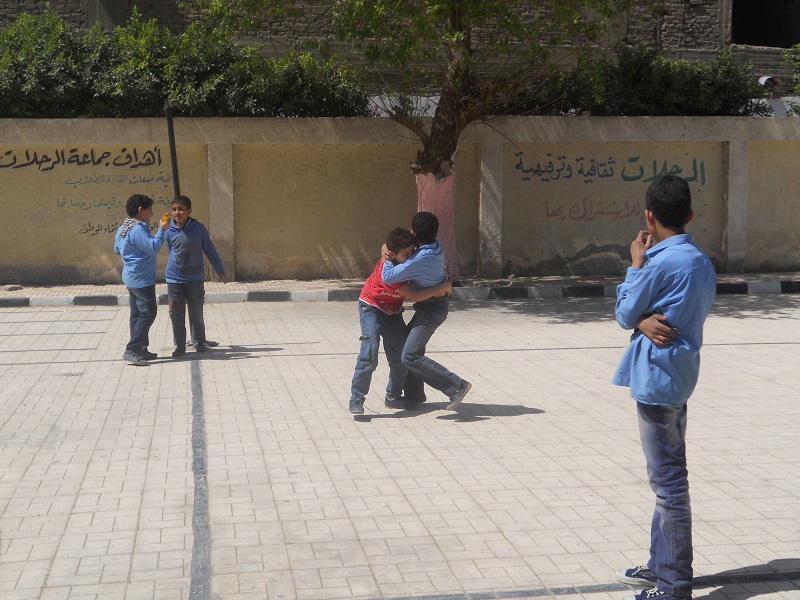
(Photo by Mohamed Omar)
The second anniversary of the 30 June uprising, which eventually led to the removal of former president Mohamed Morsi and his Muslim Brotherhood government by the army, arrived amidst inflamed security conditions.
Questions are being raised over relations between the factions that rallied for the uprising and the regime that took over.
A day before the anniversary, Prosecutor General Hisham Barakat was assassinated in an attack that targeted his motorcade earlier in the day in the Heliopolis district of Cairo.
The reactions that followed highlighted the state’s will to implement exceptional measures in a bid to quash further escalation of violence.
As a first step, the state opted to work on lawsuits, in which Brotherhood leaders and members are being tried, and those in which they have already received death and life imprisonment sentences.
President Abdel Fattah Al-Sisi said the Penal Code contains “obstacles to judges’ work, mainly in preventing punishment of those who shed the blood of Egyptians”.
Al-Sisi clearly stated the law will be amended to serve the verdicts issued, especially death penalties and life imprisonment.
In a conference held in the headquarters of the Socialist Popular Alliance Party, representatives of liberal and leftist political parties and movements that rallied for 30 June discussed the current situation and the relationship with President Abdel Fattah Al-Sisi’s regime.
Dullness and flaccidity
Veteran opposition figure and member of the semi-official National Council for Human Rights (NCHR), George Ishaq, was optimistic, but nonetheless heaped criticism on the regime.
“After 30 June the expectations were high, we wanted national collaboration and electoral law that achieves the ambitions. The current state reflects dullness, flaccidity and performance with a Mubarak flavour,” Ishaq said.
The cofounder of the Kefaya movement, a political opposition movement that was vocal in the Mubarak era, highlighted the state of enmity between the youth, who marshalled the 25 January Revolution against Mubarak, and the ruling regime.
“60% of the population are youth and the regime is creating enmities with them,” he said.
“What happens now is not in Al-Sisi’s favour at all. Businessmen and police are taking revenge for what happened in [the 25 January Revolution]. I demand Al-Sisi to change his advisors,” he asserted.
However, and concerning the current wave of militancy, he assured that “the Egyptian people are capable of overcoming the crisis”.
The way to counter terrorist ideologies
Khaled Dawoud, the spokesman of Al-Dostour Party and member of the National Salvation Front, the movement that rose to lead the opposition against the Brotherhood rule, said: “We didn’t wish the arrival of second anniversary in these conditions.”
He stated that the way to counter terrorist ideologies and extremism is through “presenting an alternative intellectual project that can represent a national project the youth can be enthusiastic to take part in”.
Dawoud recalled accusations that faced the civil parties recently as they were accused by supporters of the Brotherhood of having participated in leading the country to an inflamed situation.
“When the [Muslim] Brotherhood supporters accuse us of being the reason behind this [current situation in Egypt] the answer is that we don’t regret [participating] in 30 June,” he said.
“Our stance is coherent since the days of Mubarak. We want a civil democratic modern state and, in addition to that, according to the nature of the parties we represent, social justice.”
He added that those parties are currently “under a fierce attack and denial of our role in 30 June as a party and the National Salvation Front. The image exported is that what happened was an individual achievement of the armed forces”.
Dawoud expressed hopes that Al-Sisi makes peace with the youth and the movements that participated in 30 June. “The country is in no need of gaining new enemies,” he said.
Monopolising power
“We condemn the criminal attack and we assert that we are a united front against terrorism, even if we disagreed on the means to do that,” said head of the leftist Al-Karama Party, Mohamed Samy.
Samy made a comparison between the aftermaths of the two uprisings that led to changing ruling regimes in the 21st century in Egypt.
“We believe that 30 June was a revolution that is an extension of the 25 January Revolution, and we were partners and creators of the 30 June revolution,” Samy said.
“The last faction to join the 25 January Revolution, the Muslim Brotherhood, managed to take over power. The party that joined 30 June last started to monopolise power and eliminate the rest of the parties,” he added.
Samy warned against spreading corruption and made a correlation between it and terrorism, saying: “Oppression and corruption create terrorism and vice versa; terrorism creates corruption and oppression.”
“So long as the ruling regime gets closer to freedoms and social justice, we will be on its side. So long as it drifts away, we will be against it,” he concluded.



